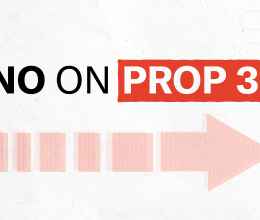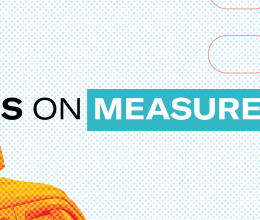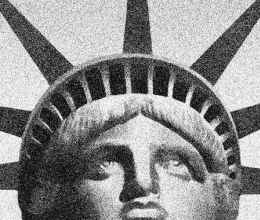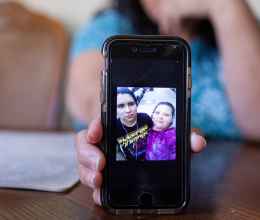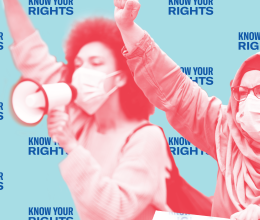
LOS ANGELES - The ACLU of Southern California filed suit in federal court today against the Los Angeles Police Department for its attacks last Monday, August 14, on members of the media during their coverage of protests at the Democratic National Convention.
The attacks occurred as journalists covered the events of Monday evening, when the LAPD stormed the protest zone as the crowd attempted to leave. Five members of the media joined the case as plaintiffs.
"This was a critical test to see whether a discredited police department could discharge its duties without violating individuals' civil rights," said Michael Small, Chief Counsel for the ACLU of Southern California. "The department failed in that charge, and then turned on those who were documenting that failure."
"The police department," said Small, "seems to believe that declaring an assembly unlawful frees officers from all constraints. But the Constitution can't be overturned by an order through a walkie-talkie, and state law can't be rewritten by megaphone. Even in an area where an unlawful assembly has been declared, both the Constitution and California's Penal Code, in Section 409.5 (d), guarantee that journalists can remain to document and report on events."
"The LAPD and the mayor are saying they passed this test with flying colors," said Ramona Ripston, Executive Director of the ACLU of Southern California. "But we have reports that the LAPD committed terrible civil rights abuses, attacking members of the media as well as peaceful protesters. We have credible accounts of our police department violating the First Amendment, the Fourth Amendment, the Fourteenth Amendment, the California Constitution, and California state law. I don't call that a success."
Throughout the last week, the ACLU has received numerous calls, in addition to those from plaintiffs named in this lawsuit, from members of the media describing police attacks on journalists. Plaintiffs include:
Al Crespo, a freelance photojournalist, was standing on the corner of Olympic and Figueroa, one block from the demonstration area near the Staples Center. He wore two 35 mm cameras, one draped around his neck, the other around his shoulder. He was wearing a white t-shirt and several bright, laminated media passes. Crespo took several photographs of the LAPD firing on protesters. Though he was more than 20 feet away from the nearest protester, Crespo was shot three times with rubber bullets. A bystander told him that he was bleeding from his head.�_ Crespo was taken by ambulance to a local hospital where he received treatment for his wounds.
David Horowitz, an award-winning journalist who covers consumer and political affairs, arrived on the scene after police ordered protesters to disperse. Horowitz began to film the LAPD's attacks on protesters from a distance he thought safe, around 100 feet away from protesters. Though his press credentials were visible, a police officer confronted him and ordered him to move. Horowitz turned around and an officer hit him three times with a baton, knocking him to the ground. Another officer kicked his camera out of his hand, breaking it, and still another kicked Horowitz's briefcase, which he was not allowed to retrieve until three hours later, when he returned to the site. At that time, he checked a 35 mm camera that was inside the briefcase. The camera was there, but the film was missing.
Greg Rothschild is a freelance audio engineer, and Kevin Graf is a freelance television cameraman. Both were working for ABC on the night of the 14th. They proceeded away from the protest zone on foot, walking backwards and filming as they left the site. At 75-100 feet away, officers opened fire on the news crew. Rothschild was hit six times, Graf, at least ten.
Jeffrey Kleinman is a freelance cameraman who was working for NBC on the night of August 14. He and his crew filmed protesters dispersing from the protest. Kleinman was filming while standing on a ladder. An officer approached in riot gear, told the crew to move, kicked the ladder, then clubbed Kleinman with a baton, causing him to fall from the ladder. Moments later, as Kleinman continued to film, another police officer opened fire on him, striking him in the abdomen with a rubber bullet. Kleinman was hit three more times in the back and shoulder as he attempted to evacuate. Other members of his crew were hit as well.
"The bullets and batons that struck these journalists were not simply aimed at them," said Ripston. "They were aimed at our basic rights to a free press and to the oversight which it can, at its best, provide over our public institutions, such as the police department."
"The dangers here, both physical and Constitutional, are grave," said Ripston. "Their actions last week demonstrate that the Los Angeles Police Department will take violent measures to operate free of the constraints of public scrutiny . but we cannot allow that to happen; we know too well what happens when the department and its officers believe that no one's looking."
